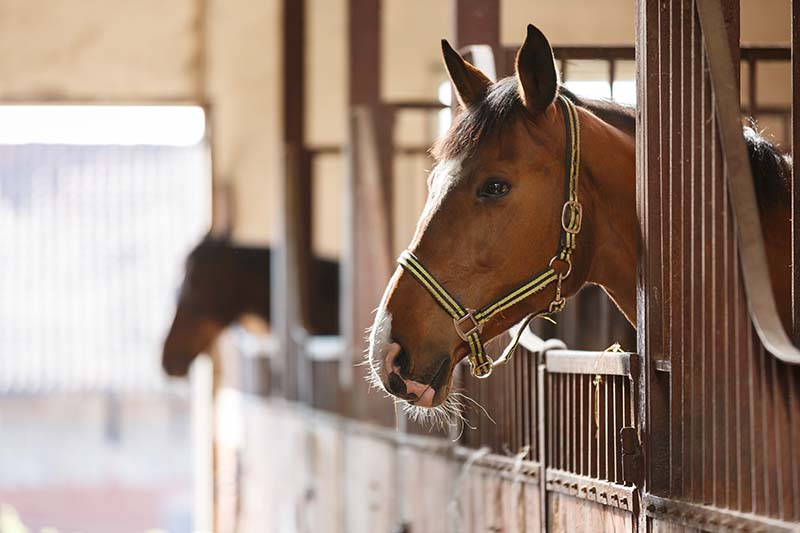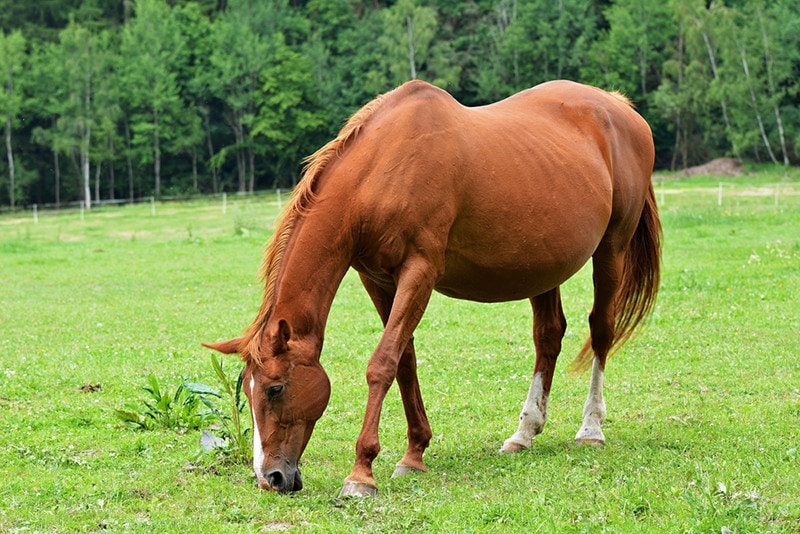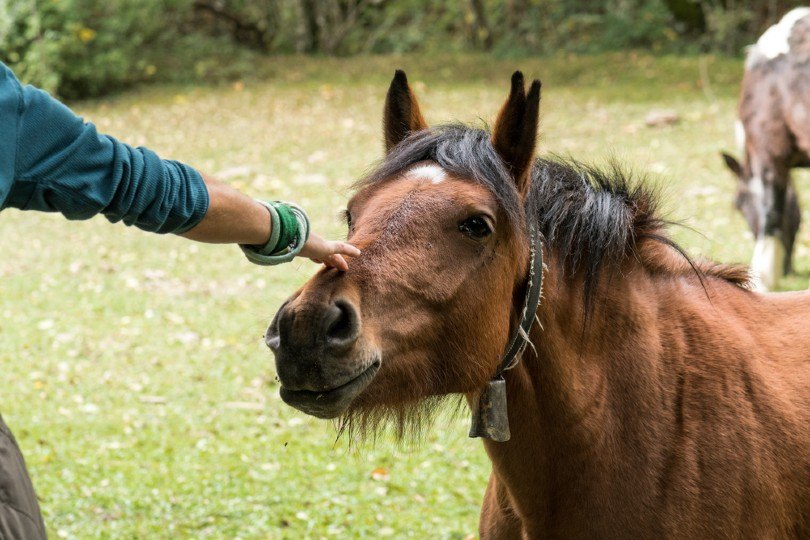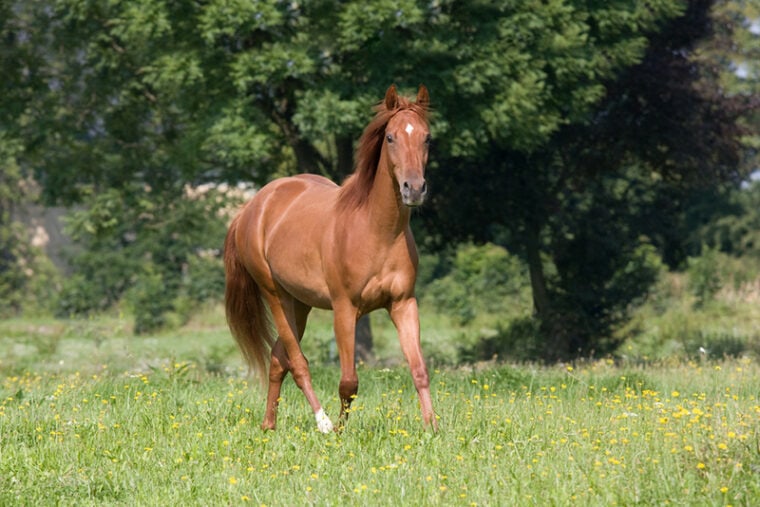
From Mustang cars to the movie Spirit, wild horses have enchanted people. They’re associated with freedom and power. But what about domesticated horses? Could a domesticated horse survive on its own? And what would happen if your horse ran away?
If you’ve ever wondered about these questions, the answer’s more complicated than a simple yes or no. In fact, nearly all horses alive today are domesticated horses—including the mustang herds that roam the western United States. But even though domesticated horses can survive in the wild, it’s unlikely that a horse raised by humans would adapt well to life in the wild. It’s also illegal to abandon your horse.
The Difference Between Wild, Domesticated, Feral, and Tame
To understand the difference between the horses in barnyards and the herds that roam free, we need to talk about a few different stages of domestication. Most animals in the world are wild. Wild animals aren’t adapted to live with humans at all—like our horses’ zebra cousins. But if you search for pictures of zebras pulling a carriage, you’ll find them! That’s because many wild animals can be tamed. Tame animals are any animals that are brought up by humans and accustomed to their presence. A tame zebra still has all the traits and instincts of a zebra—and it won’t ever be as loving or reliable as a horse—but it has been taught to trust and obey humans.
Domesticated animals, like horses, are different. When animals are tamed for generation after generation, their bodies begin to adapt to living with humans, and their instincts change too. Domesticated animals are often bigger, calmer, and more trusting than their wild ancestors. Horses were domesticated in Eurasia about 6,000 years ago.
Along with domesticated, wild, and tame, the last category to know about is feral. Domesticated animals occasionally escape to the wild and survive. They can even have babies and create new feral populations. But they still aren’t the same as wild animals—they still have the instincts of a domesticated animal. If you had raised a newborn feral animal, it would be just like any other domestic animal.
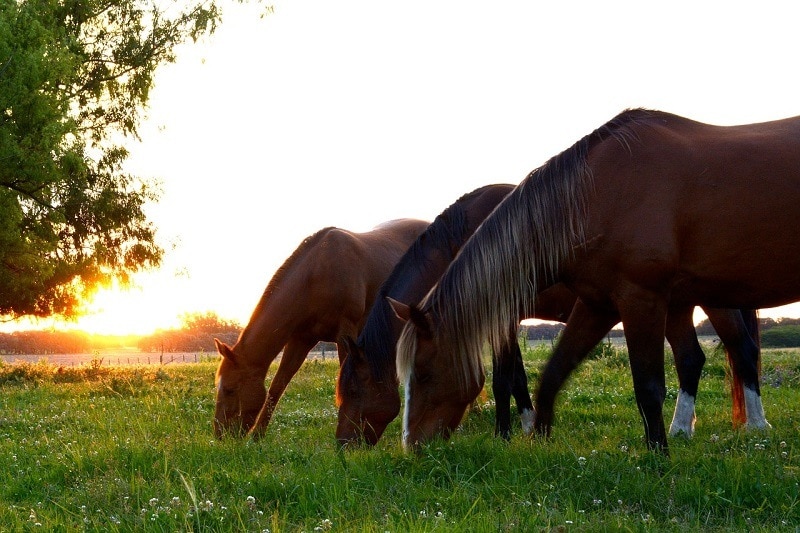
The World’s Last Wild Horses
If you’re looking for a truly wild horse, there’s only one place to go—Mongolia. There, you can find Przewalski’s horses. This small, tan species of horse is smaller and less graceful-looking than a domesticated horse, free of the changes that domestication has brought. They’re also endangered. In fact, in the mid-1900s they were extinct in the wild. However, the species is a major conservation success—today, there are nearly 2,000 of them. But Przewalski’s horses aren’t the only horses you can find roaming free in the wild.
The Mustang Story: Today’s Feral Horses
When you see a clip of a herd of wild horses roaming anywhere in the United States, they’re technically feral. Ancestors of modern horses actually evolved in the Americas, but they went extinct around the last ice age. For about ten thousand years, the United States was horse-free.
Then the Spanish Conquistadors came to the Americas, bringing all sorts of wonders—including horses. Some of those horses escaped into the wild and went feral. These wild herds actually beat Europeans to first contact in many areas, multiplying and spreading across the Great Plains. Today, these wild horses are known as mustangs. They’re found in ten US states—Arizona, California, Colorado, Idaho, Montana, Nevada, New Mexico, Oregon, Utah, and Wyoming.
Could Your Horse Survive on its Own?
The success of mustang herds shows that it is possible for a domesticated horse to survive in the wild. These horses have lived on their own for at least four hundred years. But that doesn’t mean that a horse raised by humans could survive in the wild. For one thing, Mustangs are still dependent on their herd. Living in a large herd gives horses protection from predators and helps them learn to survive without help from humans.
Another problem is that the areas where horses survive on their own are less hospitable today. Because of habitat loss and increased human presence, the number of mustangs has fallen dramatically. Today, the herds are protected by law and managed by the Bureau of Land Management. An escaped horse doesn’t have any of these protections. (In fact, it’s illegal to abandon your horse.)
But the biggest barrier to a horse surviving on its own is its relationship to humans. Escaped pets trust humans and rely on them for food and shelter. If a tame, human-raised horse is abandoned, it will likely go straight to the nearest person when it runs into trouble. Pet horses haven’t been raised to be self-reliant like wild and feral herds. The Bureau of Land Management occasionally rescues abandoned horses that are starving or injured from their time in the wild. These horses are adopted out when possible and sometimes need to be put down.

Tips for Keeping Your Horse Safe
If you own a horse, it’s important to protect it from the wild. Some horses are escape artists that jump fences, open gates, and break down barriers. Most of the time, these horses will eventually find their way back home. But in the meantime, it’s a dangerous world.
Keeping your horses protected starts with building a good relationship with them, handling them often. You should keep your horse in a safe space with sturdy, high fences, and sufficient food, water, and shelter. If your horse loves escaping, you may need to get creative with blocking possible escape routes—like adding extra locks to a gate that your horse learns to unlatch.
If your horse does escape, keep calm. If necessary, you can alert local authorities to be on the lookout for a loose horse. Once you’ve found your horse, you can usually recapture it by “herding” it into a corral or enclosed space. Have handlers stand in the way of any flight path except the path you want it to take, and then calmly approach your horse. Most horses will walk away from you in the only open direction. Once you’ve driven your horse somewhere safe and enclosed, wait until it is calm enough to put a halter and lead rope on it.
Conclusion
Even though there are feral herds of horses that can survive in the wild, most domestic horses aren’t up for the task. Domestic horses don’t have a herd to protect them, and they often rely on humans for survival. Wild horses might look free and powerful, but your pet will be much happier at home.
Featured Image Credit: Lenkadan, Shutterstock



